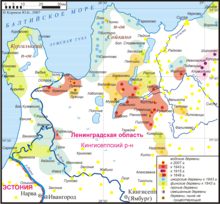Wotic language
| Wotisch (vad'd'a tšeeli) | ||
|---|---|---|
|
Spoken in |
Russia | |
| speaker | 15th | |
| Linguistic classification |
|
|
| Language codes | ||
| ISO 639 -1 |
- |
|
| ISO 639 -2 |
vot |
|
| ISO 639-3 |
vot |
|

The Wotic language is an endangered language of the Finno-Ugric language family .
The Voten , the original speakers of this language, are the second population group in Ingermanland in present-day Russia next to the Ingrians . According to H. Heinsoo from 1989, from whom the last data on this language comes, 112 people reported speaking this language in the census in Russia. The name is vad'd'alain , the meaning and origin of which are unknown.
Four main dialects of this language are known, but most of them have already died out:
- West Votic
- Kukkusi Wotisch (extinct)
- Ostwotisch (extinct in the 1960s)
- Krewinisch in southern Latvia (extinct in the 19th century)
There is no written language .
Linguistically, Wotisch is most closely related to Estonian . Wotisch belongs to the southern group of Baltic Finnish languages within the Finno-Ugric languages and has their typical features.
Wotisch has fourteen cases and, as a special feature, six tenses within the Finno-Ugric languages , including the future tense , which is completely atypical for Finno-Ugric languages .
In the phonetics of the Wotish it is noticeable that it is very rich in diphthongs , but has a comparatively weak consonant system , especially the lack of voiced fricatives . In contrast, the frequency of š and tš , which is the result of a Votic sound shift, is striking . For example, Baltic Finnish k before e, ä and i became tš , cf. Finnish kenkä, mäki, kieli , wotisch tšentšä, mätši, tšeeli .
While other Finno-Ugric languages such as Wepsic have almost given up the level change , this has not only been preserved in Wotic, but has also developed further.
The vocabulary of Votic shows strong influences from Russian .
literature
- Paul Ariste : A Grammar of the Votic Language. Curzon Press, Bloomington (?) 1997.
- Dmitri Tsvetkov : Vadja keele grammatika. Eesti Keele Sihtasutus, Tallinn 2008, ISBN 978-9985-79-216-2 .
- Vadja keele sõnaraamat. Volume 1. Eesti Keele Institute, Tallinn 1990, ISBN 978-9985-79-303-9 .
Web links
Individual evidence
- ↑ Report for language code: vot. Ethnologue , accessed on October 17, 2011 .